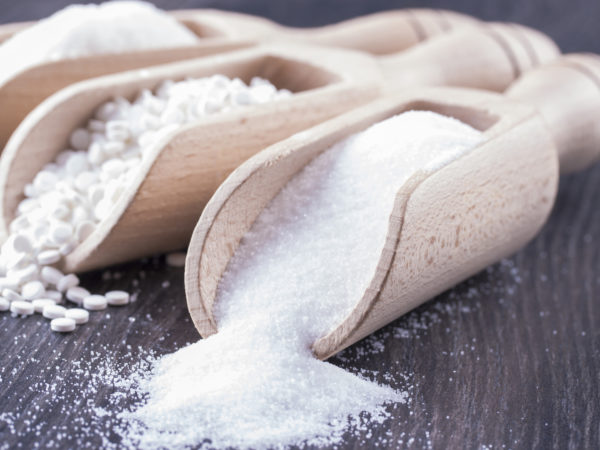Sweet and Natural?
What is tagatose? I heard it mentioned as a sugar substitute, but it’s a new one on me. Is it safe or just another sweetener we should avoid? And what’s the latest word on the safety of Splenda?
Andrew Weil, M.D. | June 23, 2008

Tagatose is a natural sweetener that is 92 percent as sweet as sugar, but has only one-third of the calories. The FDA approved its use in foods and beverages in 2001. You’ll see it in packaged cereals and diet sodas, and it is also used in mouthwash, toothpaste, lipstick and in various drugs, both prescription and over-the-counter.
Tagatose is made from milk sugar (lactose) and is safe for people with diabetes. In fact, a study published in the February 2008 issue of Diabetes, Obesity and Metabolism suggests that taken before a meal, tagatose may prevent the blood sugar spikes that can lead to complications of diabetes. Along with stevia, a no-cal sweetener extracted from the leaves of a South American shrub, and erythritol, a natural substance new on the market, tagatose is the only sugar substitute I would consider for people with diabetes and others who can’t tolerate sugar.
Splenda (sucralose) is the best selling artificial sweetener. It is made by substituting three chlorine molecules for three hydrogen-oxygen groups on the sugar molecule. This changes sugar into an artificial sweetener that can’t be metabolized, meaning our bodies can’t digest it or derive energy from it.
The safety of Splenda has been controversial for some time. Citizens for Health, a nonprofit group, maintains that adverse effects ranging from stomach pains to headaches and skin rashes have been reported by users. In April 2007, the group petitioned the FDA to withdraw approval until more is known about the sweetener’s safety. To the best of my knowledge, studies on Splenda – those attesting to its safety and those warning of dangers – have all been done in animals. I can find no human data demonstrating that Splenda can cause any health problems; nor can I find human data proving its safety. I would follow the precautionary principle here and avoid it. The natural sugar substitutes mentioned above look better to me.
If you use artificial sweeteners, there’s no proof that I’ve been able to locate that these products will actually help you lose weight. In fact, circumstantial evidence suggests that they may make matters worse: the number of Americans consuming artificially sweetened food and drink rose from 70 million in 1987 to 160 million in 2000. During that same period, obesity rates rose dramatically.
Andrew Weil, M.D.










